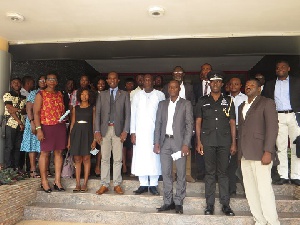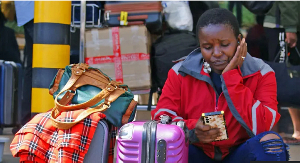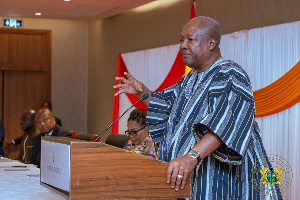Participants at a Stakeholders’ Dialogue on Cyber Security Issues, organised by the Media Foundation for West Africa (MFWA) on Thursday, have urged government to fast truck the implementation of the National Cyber Security Policy and Strategy (NCSPS).
The NCSPS seeks to protect the sovereignty and interest of the State and the rights of individuals in the cyberspace.
Cabinet in November 2016, approved the implementation of the NCSPS to empower the National Computer Emergency response team (CERT-GH) to continue the fight against cybercrime.
However, seven months down history lane, government is yet to hit the ground running with the NCSPS implementation.
The participants also urged government to involve all stakeholders such as the civil society organisations (CSOs), the media, academia and the private sector in the implementation of the NCSPS.
The stakeholders were of the view that issues of cyber security was of interest to all Ghanaians since majority used the internet.
They, therefore, called on government to build a resilient cyberspace and ensure that the rights of the individual is respected and protected online.
They recommended that both the private sector and the government should pursue proactive information disclosure to the citizenry.
The workshop, on the theme: “Ghana’s Cyber Security Environment: Challenges and the Way Forward,” was attended by members of the national security agencies, experts in the digital space, academia, the media and the CSOs.
It was designed to build knowledge on cyber security and to allow agencies involved in fighting cybercrime to share cutting-edge knowledge on their cyber security initiatives as well as status of their activities and efforts towards implementing the NCSPS.
Among the discussants at the workshop were Mr Vincent Sowah Odotei, a Deputy Minister of Communications; Mr Albert Antwi-Boasiako, the Principal Consultant of e-Crime Bureau; Mr Adu Boahene, the Director of Communications, Ministry of National Security, and Mr Sulemana Braimah, the Executive Director of the MFWA.
Mr Odotei said government was trying to put things in place to facilitate the implementation of the NCSPS to make it more relevant to society.
He said government was taking the issue of cyber security very seriously adding that the capacity of the security agencies would be built to help equip them to fight cybercrime.
Mr Antwi-Boasiako said government and stakeholders had taken actions to address cyber security challenges, however, there remained significant gaps in tackling the nation’s cyber security vulnerabilities.
He said cybercrime was like an octopus, which could engulf anyone or organisation and, therefore, called for proactive measures to address the challenges of cyber security.
Mr Adu Boahene, on his part, urged CSOs to be responsive on cyber security issues and to put up constructive criticisms adding that government was taking cyber security issues very seriously.
He called for a multi-stakeholder approach in tackling cyber security and cybercrime in the country.
Mr Sulemana Braimah said as the country grew in terms of the digital space, cyber security issues also become a threat.
“It is something that we cannot say government alone should do or a ministry or a department alone should do. Because the use of the internet predominantly involves we the ordinary citizens and, therefore, it is important that from a civil society perspective, from an ordinary person’s perspective we have this kinds of conversations.
“So that we can have the key stakeholders telling us what the issues are and what the status is and how we plan to confront challenges such as cyber security,” he said.
On the way forward, Mr Braimah said there was the need for all stakeholders to collaborate on cyber security so that the citizenry would enjoy the fruit of the cyberspace.
General News of Friday, 30 June 2017
Source: GNA













